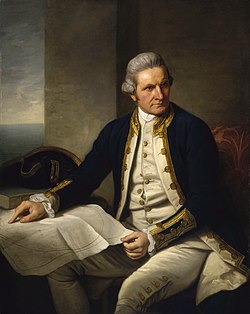
Back James Cook Afrikaans James Cook ALS ጄምስ ኩክ Amharic James Cook AN Iacobus Cōc ANG جيمس كوك Arabic دجيمس كوك ARY جيمس كوك ARZ জেমছ কুক Assamese James Cook AST
James Cook | |
|---|---|
 | |
| Born | 7 November 1728 |
| Died | 14 February 1779 (aged 50) Kealakekua Bay, Hawaii |
| Education | Postgate School, Great Ayton |
| Occupation(s) | Explorer, cartographer and naval officer |
| Spouse | |
| Children | 6 |
| Military career | |
| Branch | Royal Navy |
| Service years | 1755–1779 |
| Rank | Captain |
| Battles / wars | |
| Signature | |
 | |
Captain James Cook (7 November 1728 – 14 February 1779) was a British Royal Navy officer, explorer, and cartographer famous for his three voyages of exploration to the Pacific and Southern Oceans, conducted between 1768 and 1779. He completed the first recorded circumnavigation of the main islands of New Zealand and was the first known European to visit the eastern coastline of Australia and the Hawaiian Islands.
Cook joined the British merchant navy as a teenager before enlisting in the Royal Navy in 1755. He served during the Seven Years' War, and subsequently surveyed and mapped much of the entrance to the St. Lawrence River during the siege of Quebec. In the 1760s, he mapped the coastline of Newfoundland and made important astronomical observations which brought him to the attention of the Admiralty and the Royal Society. This acclaim came at a crucial moment in British overseas exploration, and it led to his commission in 1768 as commander of HMS Endeavour for the first of three Pacific voyages.
During these voyages, he sailed thousands of miles across largely uncharted areas of the globe. He mapped coastlines, islands, and features across the Pacific from Hawaii to Australia in greater detail than previously charted. He made contact with numerous indigenous peoples, and he claimed many territories for Britain. He displayed a combination of seamanship, superior surveying and cartographic skills, physical courage, and an ability to lead men in adverse conditions. His pioneering contributions to the prevention of scurvy led the Royal Society to award him the Copley Gold Medal.
In 1779, during his second visit to Hawaii, Cook was killed when a dispute with Native Hawaiians turned violent. His voyages left a legacy of scientific and geographical knowledge that influenced his successors well into the 20th century. Numerous memorials have been dedicated to him worldwide. However, he remains a controversial figure because of his occasionally violent encounters with indigenous peoples, and allegations that he facilitated British colonialism in the Pacific.
© MMXXIII Rich X Search. We shall prevail. All rights reserved. Rich X Search